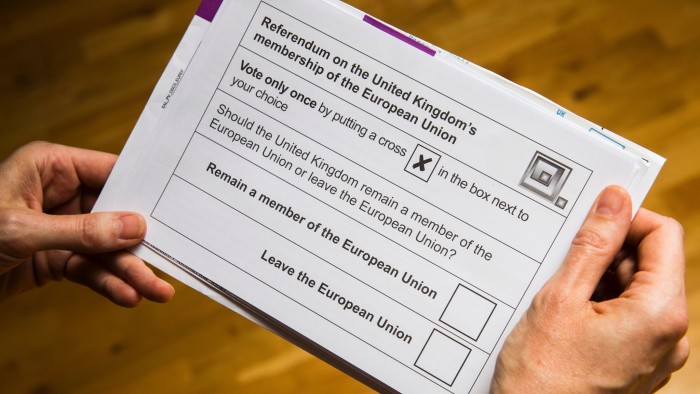As a moderate Eurosceptic, I have plumped to vote Remain

Roula Khalaf, Editor of the FT, selects her favourite stories in this weekly newsletter.
Moderate Eurosceptics are in a bind: which way to vote when it comes to the crunch? The decision facing those who have little love for the EU comes down to fear: do you believe Britain faces a greater risk staying tied to Brussels or does running away to do our own thing pose the bigger danger?
Fellow waverers, I feel your pain. From the first day of this tedious referendum campaign, I have agonised over how to vote. I wanted to believe in Brexit. The time had come, I thought, for us to part ways with a dysfunctional institution that often fails Britain. I believed in Michael Gove’s promise of a “democratic liberation of a whole continent”. I accepted we needed to rethink border controls. I bought into the vision of an independent Blighty that would be economically stable and politically confident. But what could have been a great moment for patriotism has sadly morphed into petty nationalism.
So, unwillingly and with little enthusiasm, I have tilted towards Remain in these final hours. In the absence of an overwhelming motivation to vote to leave, I have defaulted to an innate conservative desire not to shake up the status quo. In campaigning terms, Vote Leave has run the superior operation but it has failed to win the intellectual argument for change.
Crucially, Outers have misfired on the economy. They have told us that we do not need to worry about a recession, it will all be fine. Brains bigger than mine, such as those at the Institute for Fiscal Studies, predict we will enter choppy waters if Britain votes to leave. I am inclined to believe the experts: look at what sterling and the markets have been doing over the past week. And if there is a recession, it won’t affect folk like me.
As a thought experiment, Brexit might be enticing. Sovereignty! Free trade! Independence! But for one of my relatives who works in Nissan’s Sunderland plant, it is a very real threat to his family’s livelihood. If the car manufacturer decides to curtail building Qashqais on Wearside, jobs will be lost. Some Brexiters think that the uncertainty would be worth it.
Arron Banks, a major United Kingdom Independence party donor, remarked: “This isn’t about pounds and pence; this is about our democracy.” Well, it is fine for him but what about ordinary voters? During the past months, Brexiters have offered no rebuttal to the economic experts. Instead, they have chosen to play the man, not the ball.
I worry that post-Brexit, the politics I most adhere to will be shunned for something more nationalistic. A year ago the British electorate handed David Cameron’s Conservative party a majority. Now that is in peril. The centrism that brought the Tories out of the wilderness and created a centrist consensus could soon vanish. The party may find itself pulled through a wormhole back to 2003 and the dark days of Iain Duncan Smith’s leadership. The natural party of government would take several paces to the right and march towards the little Britain of Nigel Farage, Ukip leader.
We also have to consider how Brexit would be perceived elsewhere: leaving would be seen as retreating. Some cerebral Leavers have persuasively advocated free-trade, free-market positions but it is the populist Outers — the pull up the drawbridge crowd — who have dominated. We may reduce the headline migration numbers but maroon ourselves in splendid isolation.
Finally, there is an emotional argument for Remain I deeply care about. The UK is, once again, at risk of splintering. Those Scottish nationalists are a crafty bunch and I have no doubt they would abuse Brexit to further their cause. The idea that the Scottish National party “would not dare” to call another referendum is laughable. It is the reason they exist, after all. It is shocking that so many in the Conservative and Unionist party are willing to risk ripping up our country.
This is not an easy decision. I still find the EU a baffling institution in desperate need of reform. It is hard to advocate something so diametrically opposed to my core political views: faraway power, bureaucracy and a lack of accountability. But no matter how compelling the idea of Leave is, the reality does not add up. This Eurosceptic, mugged by reality, will reluctantly vote to remain.
sebastian.payne@ft.com
Comments